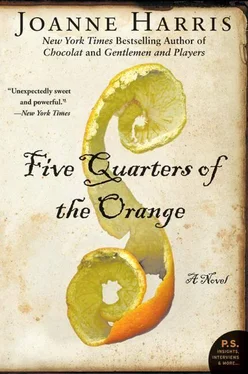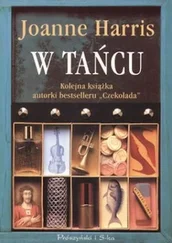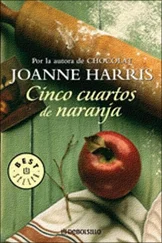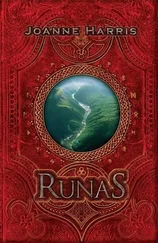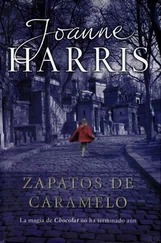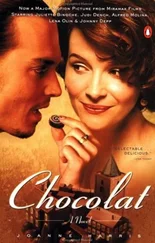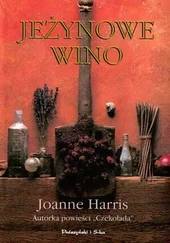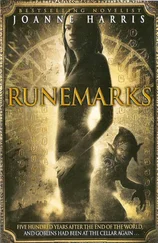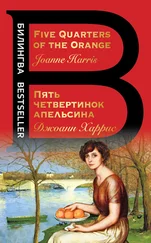I dropped a pastry I had been eating and turned again, unnoticed, to go. Tomas was waiting for me. Suddenly it was very important to believe that Tomas was waiting. Tomas, who loved me. Tomas, only Tomas, forever. For a moment I turned back, fixing the scene into my mind. My sister the harvest queen, the most beautiful harvest queen ever crowned, the sheaf in one hand and in the other a round bright fruit-an apple, maybe, or a pomegranate-pressed into her palm by Père Froment, their eyes meeting, he smiling in his sweet sheepy way, my mother, the smile freezing on her bright face in a sudden gesture of recoil, her voice coming to me thinly over the sound of the merry crowd- What’s that? For God’s sake, what’s that? Who gave you that? Not an apple then, I realized, or even a pomegranate. The harvest queen’s prize was an orange.
I ran then, while attention was diverted from me. Almost laughing, with the invisible wasp still stinging at my eyelids I ran as fast as I could back to the river, my thoughts a blur. Every now and again I had to stop to quiet the spasms that cramped my stomach, spasms eerily like laughter but that sent tears spurting from my eyes. That orange! Stored with care and love for just this occasion, kept hidden in tissue paper for the harvest queen, globed in her hand as Mother-as Mother…The laughter was like acid inside me but the pain was exquisite, rolling me to the ground, tugging at me like fishhooks. The look on my mother’s face convulsed me whenever I thought of it, the look of pride turning to fear-no, terror -at the sight of a single, tiny orange. Between spasms I ran as fast as I could, calculating that it might take ten minutes to arrive at the Lookout Post, adding to that the time we had spent at the fountain-twenty at least-gasping with fear that Tomas might already have left.
This time I’d ask him, I promised myself. I’d ask him to take me with him this time, wherever he was going, back to Germany or into the woods on the run forever, whatever he wanted as long as he and I-he and I…I prayed to Old Mother as I ran, brambles snagging at my bare legs unheeded. Please, Tomas. Please. Only you. Forever. I met no one on my mad run across the fields. Everyone else was at the festival. By the time I reached the Standing Stones I was calling his name out loud, my voice shrill as a peewit’s in the silky silence of the river.
Could he already have gone?
“Tomas! Tomas!” I was hoarse from laughing, hoarse with fear. “ Tomas! Tomas! ”
I almost didn’t see him, he was so quick. Sliding out of a stand of bushes, one hand clamping around my wrist, the other over my mouth. For a second I hardly even recognized him-his face dark-and I struggled wildly, trying to bite his hand, making small birdlike sounds against his palm.
“Shh, Backfisch, what the hell are you trying to do?” I recognized his voice and stopped struggling.
“Tomas. Tomas.” I couldn’t stop saying his name, the familiar scent of tobacco and sweat from his clothes filling my nostrils. I clutched his coat close to my face in a way I would never have dared two months ago. In the secret darkness of it, I kissed the lining with desperate passion. “I knew you’d come back. I knew you would.”
He looked at me, saying nothing. “Are you alone?” His eyes looked narrower than usual, wary. I nodded.
“Good. I want you to listen.” He spoke very slowly, emphatically, enunciating every word. There was no cigarette at the corner of his mouth, no gleam in his eyes. He seemed to have got thinner in the past few weeks, his face sharper, his mouth less generous.
“I want you to listen carefully.”
I nodded my obedience. Whatever you want, Tomas. My eyes felt bright and hot. Only you, Tomas. Only you . I wanted to tell him about my mother and Reine and the orange, but sensed that this was the wrong time. I listened.
“There may be men coming to the village,” he said. “Black uniforms. You know what that means, don’t you?”
I nodded. “German police,” I said. “S.S.”
“That’s right.” He spoke in a clipped, precise tone very unlike his usual careless drawl. “They may be asking questions.”
I looked at him without comprehension.
“Questions about me,” said Tomas.
“Why?”
“Never mind why.” His hand was still tight, almost painfully so, around my wrist. “There are things they might ask you. Things about what we’ve been doing.”
“You mean the magazines and stuff?”
“That’s right. And about the old man at the café. Gustave. The one who drowned.” His face looked grim and drawn. He turned my face to look at his, coming very close. I could smell cigarette smoke on his collar and on his breath. “Listen, Backfisch . This is important. You mustn’t tell them anything . You’ve never seen me. You weren’t at La Rép the night of the dance. You don’t even know my name. All right?”
I nodded.
“Don’t forget,” insisted Tomas. “You don’t know anything. You’ve never spoken to me. Tell the others.”
I nodded again, and he seemed to relax a little.
“Something else too.” His voice had lost its harshness, becoming almost caressing. It made me feel soft inside, like warm caramel. I looked at him expectantly.
“I can’t come here again,” he said gently. “Not for a while, anyway. It’s getting too dangerous. I only just managed to get away with it last time.”
I was silent for a moment. “We could meet at the cinema instead,” I suggested shyly. “Like we used to do. Or in the woods-”
Tomas shook his head impatiently. “Aren’t you listening?” he snapped. “We can’t meet at all. Not anywhere.”
Cold prickled over my skin like snowflakes. My mind was a surging black cloud.
“For how long?” I whispered at last.
“A long time.” I could feel his impatience. “Maybe forever.”
I flinched and began to shake. The prickling had turned to a hot stinging sensation, like rolling in nettles. He took my face in his hands.
“Look, Framboise,” he said slowly. “I’m sorry. I know you-” he broke off then, suddenly. “I know it’s hard.” He grinned, a fierce but somehow rueful grin, like a wild animal trying to mimic friendliness.
“I brought you some things,” he said at last. “Magazines, coffee.” Again that tight, cheery grin. “Chewing gum. Chocolate. Books.”
I looked at him in silence. My heart felt like a lump of cold clay.
“Just hide them, won’t you?” His eyes were bright, the eyes of a child sharing a delightful secret. “And don’t tell anyone about us. Not anyone at all.”
He turned to the bush from which he had sprung and pulled out a parcel tied up with string.
“Open it,” he urged.
I stared at him dully.
“Go on.” His voice was tight with enforced cheer. “It’s yours.”
“I don’t want it.”
“Ah, Backfisch , come on …” He reached out to put his arm around me, but I pushed him away.
“ I said I don’t want it! ” It was my mother’s voice again, screamy and sharp, and suddenly I hated him for bringing it out of me. “ I don’t want it, don’t want it, don’t want it! ”
He grinned at me helplessly. “Ah, come on,” he repeated. “Don’t be like that. I only-”
“We could run away,” I said abruptly. “I know lots of places in the woods. We could run away and no one would ever know where to find us. We could eat rabbits and things…mushrooms…berries…” My face was burning. My throat felt sore and parched. “We’d be safe,” I insisted. “No one would know…” But I could see from his face that it was useless.
I can’t,“ he said with finality.
Читать дальше
